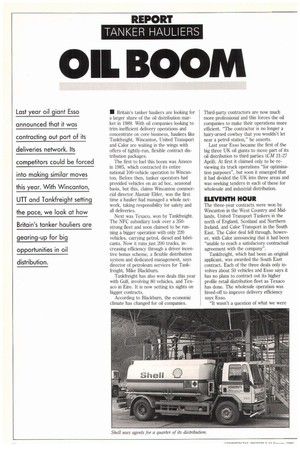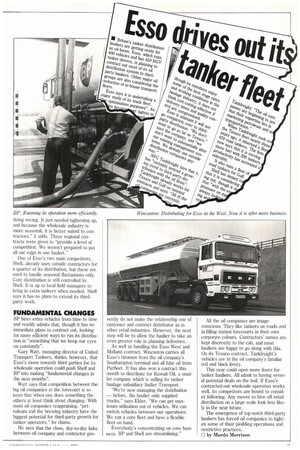OIL BOOM
Page 32

Page 33

If you've noticed an error in this article please click here to report it so we can fix it.
• Britain's tanker hauliers are looking for a larger share of the oil distribution market in 1989. With oil companies looking to trim inefficient delivery operations and concentrate on core business, hauliers like Tartkfreight, Wincanton, United 'Transport and Calor are waiting in the wings with offers of tightly-run, flexible contract distribution packages.
The first to fuel this boom was Amoco in 1985, which contracted its entire national 100-vehicle operation to Wincanton. Before then, tanker operators had provided vehicles on an ad hoc, seasonal basis, but this, claims Wincanton commercial director Alastair Elder, was the first time a haulier had managed a whole network, taking responsibility for safety and all deliveries.
Next was Texaco, won by Tankfreight. The NFC subsidiary took over a 350strong fleet and soon claimed to be running a bigger operation with only 220 vehicles, carrying petrol, diesel and lubricants. Now it runs just 200 trucks, increasing efficiency through a driver incentive bonus scheme, a flexible distribution system and dedicated management, says director of petroleum services for Tankfreight, Mike Blackburn.
Tankfreight has also won deals this year with Gulf, involving 80 vehicles, and Texaco in Eire. It is now setting its sights on bigger contracts.
According to Blackburn, the economic climate has changed for oil companies. Third-party contractors are now much more professional and this forces the oil companies to make their operations more efficient. "The contractor is no longer a hairy-arsed cowboy that you wouldn't let near a petrol station," he asserts.
Last year Esso became the first of the big three UK oil giants to move part of its oil distribution to third parties (CM 21-27 April). At first it claimed only to be reviewing its truck operations "for optimisation purposes", but soon it emerged that it had divided the UK into three areas and was seeking tenders in each of these for wholesale and industrial distribution.
ELEVENTH HOUR
The three-year contracts were won by Wincanton in the West Country and Midlands, United Transport Tankers in the north of England, Scotland and Northern Ireland, and Calor Transport in the South East. The Calor deal fell through, however, with Calor announcing that it had been "unable to reach a satisfactory contractual agreement with the company".
Tankfreight, which had been an original applicant, was awarded the South East contract. Each of the three deals only involves about 50 vehicles and Esso says it has no plans to contract out its higher profile retail distribution fleet as Texaco has done. The wholesale operation was hived-off to improve delivery efficiency says Esso.
"It wasn't a question of what we were BP: Running its operation more efficiently.
doing wrong. It just needed tightening up, and because the wholesale industry is more seasonal, it is better suited to contractors." it adds. Three regional contracts were given to "prmide a level of competition. We weren't prepared to put all our eggs in one basket."
One of Esso's two main competitors, Shell, already uses outside contractors for a quarter of its distribution, but these are used to handle seasonal fluctuations only. Core distribution is still controlled by Shell. It is up to local field managers to bring in extra tankers when needed. Shell says it has no plans to extend its thirdparty work.
FUNDAMENTAL CHANGES
BP hires extra vehicles from time to time and readily admits that, though it has no immediate plans to contract out, looking for more efficient ways to run its distribution is "something that we keep our eyes on constantly".
Gary Watt, managing director of United Transport Tankers, thinks, however, that Esso's move towards third parties for its wholesale operation could push Shell and BP into making "fundamental changes in the next months".
Watt says that competition between the big oil companies at the forecourt is so keen that when one does something the others at least think about changing. With most oil companies reappraising, "petroleum and the brewing industry have the biggest potential for third-party growth for tanker operators," he claims.
He says that the close, day-to-day links between oil company and contractor pre
sently do not make the relationship one of customer and contract distributor as in other retail industries. However, the next step will be to allow the haulier to take an even greater role in planning deliveries.
As well as handling the Esso West and Midland contract, Wincanton carries all Esso's bitumen from the oil company's Southampton terminal and all lube oil from Purfleet. It has also won a contract this month to distribute for Kuwait Oil, a smaller company which is selling its tanker haulage subsidiary Sadler Transport.
"We're now managing the distribution — before, the haulier only supplied trucks," says Elder. "We can get maximum utilisation out of vehicles. We can switch vehicles between our operations. We run a core fleet and have a flexible fleet on hand.
Everybody's concentrating on core business. BP and Shell are streamlining." All the oil companies are imageconscious. They Like tankers on roads and in filling station forecourts in their own corporate colours. Contractors' names are kept discreetly to the cab, and most hauliers are happy to go along with this. On its Texaco contract, Tankfreight's vehicles are in the oil company's familiar red and black livery.
This year could open more doors for tanker hauliers. All admit to having several potential deals on the boil. If Esso's contracted-out wholesale operation works well, its competitors are bound to consider following. Any moves to hive off retail distribution on a large scale look less likely in the near future.
The emergence of top-notch third-party hauliers has forced oil companies to tighten some of their plodding operations and restrictive practices.
0 by Murdo Morrison
















































































